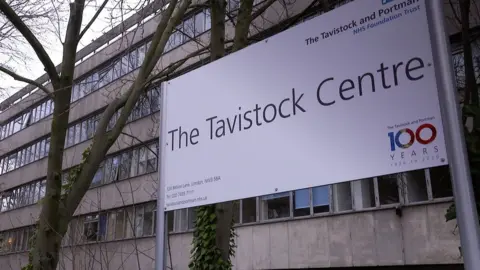NHS Tavistock child gender clinic rated 'inadequate'
 BBC
BBCThe NHS's child gender-identity service has been rated "inadequate" after inspectors identified "significant concerns".
The Care Quality Commission inspected the Gender Identity Development Service (Gids) at the Tavistock and Portman NHS Trust in October.
More than 4,600 young people were on the waiting list and some had waited over two years for a first appointment.
The trust said it took the CQC report "very seriously".
Monthly updates
England and Wales' only children's gender-identity service was inspected after healthcare professionals and the children's commissioner for England raised concerns around "clinical practice, safeguarding procedures, and assessments of capacity and consent to treatment".
The children's commissioner had been provided evidence of staff concerns by BBC Newsnight.
The CQC's previous inspection, in 2016, had resulted in an overall "good" rating.
But in the latest inspection at clinics run by the trust in north London and Leeds, Gids was rated:
- "inadequate" for being well led and responsive to patients' needs
- "requires improvement" for being safe and effective
- "good" for being caring - with staff being said to treat young people with "compassion and kindness"
Overall, the service is now rated as "inadequate".
And the CQC has begun enforcement action, demanding monthly updates of the numbers on the waiting list and actions to reduce them.
The inspectors found Gids "difficult to access" and raised concerns over managing the risk to those on the waiting list, saying many of those waiting for or receiving a service were "vulnerable and at risk of self-harm".
"The size of the waiting list meant that staff were unable to proactively manage the risks to patients waiting for a first appointment," they added.
'Insufficient records'
Record-keeping at Gids was also criticised, with the CQC noting that "staff had not consistently recorded the competency, capacity and consent of patients referred for medical treatment before January 2020".
This had changed since, but the CQC noted that in an audit of 10 records of young people referred for hormone blockers in March 2020, "only three contained a completed consent form and checklist for referral".

Analysis
by Hannah Barnes and Deborah Cohen, BBC Newsnight
A rating of inadequate is the lowest a healthcare provider can receive from the Care Quality Commission. It means that a service is "performing badly".
Gids had been rated good at its last inspection in 2016, but since then a number of concerns have been raised about the service.
The number of young people referred to Gids has increased significantly in recent years - leading to some of the delays in care highlighted by the inspection.
BBC Newsnight has explored the standard of healthcare received by young people questioning their gender identity for the last 18 months.
In that time, NHS England has changed its guidance on the use of puberty blockers to treat gender dysphoria, saying little is known about the long-term side effects, and an independent review of this area of health is under way.
Last June we revealed how some Gids staff had raised serious concerns about safeguarding at the service, the speed of assessments, and whether patients' traumatic backgrounds and other difficulties were always adequately explored.
The comments were made as part of an official internal review into Gids, which also described how staff felt they had been "shut down". We also discovered that some of these concerns dated back to 2005.

Furthermore, it was not possible to clearly understand why clinical decisions had been made.
After reviewing 35 care records, the CQC found there was "no clearly defined assessment process" and "many records did not demonstrate good practice".
The records also appeared to be "insufficient" in considering the needs of young people with autism spectrum disorders.
In a sample of 22 records, the CQC found more than half mentioned autistic spectrum disorder or attention deficit hyperactivity disorder (ADHD), but "records did not demonstrate consideration of the relationship between autistic spectrum disorder and gender dysphoria".
Significant variation in the clinical approach of different staff members was also noted. Assessments of young people ranged from "two or three sessions" in some cases to over 25, or even more than 50.
'Sorry to patients'
CQC deputy chief inspector of hospitals Kevin Cleary said his team continued to monitor the trust "extremely closely" and inspected the service again because "we were extremely clear that there were improvements needed in providing person-centred care, capacity and consent, safe care and treatment, and governance".
"In addition, vulnerable young people were not having their needs met as they were waiting too long for treatment."
The leadership at the trust knew "exactly what improvements are needed", he added.
The trust said: "We take the CQC's report very seriously and would like to say sorry to patients for the length of time they are waiting to be seen, which was a critical factor in arriving at this rating."
Accepting there was a "need for improvements in our assessments, systems and processes", the trust said it agreed with the CQC that the "growth in referrals has exceeded the capacity of the service".
It added improvements were being made, saying: "We are already finalising plans to bring in senior clinical and operational expertise from outside the service to help us implement the necessary changes and consider how we can improve on current processes and practice - including how we standardise our assessment process."
